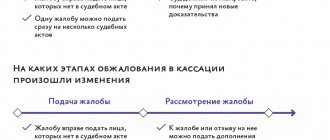Appeal
Reasons
The arbitration court in the first instance can adopt three types of judicial acts: decisions, rulings and court orders. In the appeal procedure, you can only appeal decisions and some rulings, the appeal of which is provided for by current legislation. Court orders can only be appealed to the cassation court.
At the same time, it must be borne in mind that in the first instance, in certain cases, cases can be considered not only by arbitration courts of constituent entities of the Russian Federation, but also by arbitration courts at other levels. For example, applications for the award of compensation for violation of the right to a trial within a reasonable time or the right to execution of a judicial act within a reasonable time are considered by district arbitration courts as a court of first instance. A wide range of cases are considered at first instance by the Intellectual Property Rights Court. Such decisions come into force at the moment of their adoption and therefore can only be appealed in cassation.
At what stage
The filing of a complaint with the arbitration court is carried out by any person participating in the case, as well as by other persons in cases where a judicial act directly affects their rights and obligations.
The system for filing complaints with the arbitration court provides for deadlines established by current legislation. The total period is one month from the date of production of the court decision in full. Along with the general one, the Arbitration Procedure Code of the Russian Federation and other federal laws provide for special (reduced) deadlines for filing a complaint for certain categories of cases.
Deadlines
An appeal to the arbitration court can be filed on:
- decisions on bringing to administrative liability - within 10 days from the date of the decision;
- decisions to challenge the decision of an administrative body to bring to administrative liability - within 10 days from the date of the decision;
- rulings to impose a court fine - within 10 days from the date of receipt of the ruling;
- rulings on the transfer of a case under jurisdiction or on refusal to transfer a case under jurisdiction - within 10 days from the date of the ruling;
- rulings on the refusal to satisfy a request for a co-plaintiff to join the case, on the refusal to satisfy a request to involve a co-defendant; on refusal to intervene in the case of a third party - within 10 days from the date of the ruling;
- on refusal to satisfy a petition to combine cases into one proceeding, on refusal to satisfy a petition to separate claims into separate proceedings - within 10 days from the date of the ruling;
- rulings in insolvency (bankruptcy) cases, the appeal of which is provided for by the Arbitration Procedure Code of the Russian Federation and other federal laws - within 10 days from the date of issuance of the ruling;
- rulings in cases of insolvency (bankruptcy) that are not provided for by the Arbitration Procedure Code of the Russian Federation and in respect of which it is not established that they are subject to appeal - within 14 days from the date of their issuance.
- decisions made through simplified proceedings - within 15 days from the date of adoption, and in the case of drawing up a reasoned decision of the arbitration court - from the date of adoption of the decision in full.
When calculating special (reduced) deadlines, only working (and not calendar) days are taken into account. An appeal may be filed at any time during the period established for appeal. A deadline for filing an appeal in an arbitration court missed for good reasons may be restored at the request of the applicant, provided that the request is filed no later than six months from the date of the decision.
Where to submit
The procedure for filing an appeal with the arbitration court is as follows: it is sent to the appellate court through the court of first instance that issued the judicial act, which within three days sends the appeal along with the case to the appellate court. If the applicant himself sends the complaint directly to the appellate court, the complaint will be returned to him.
An appeal can be submitted in writing by mail or directly to the office of the arbitration court that issued the judicial act, or electronically through a personal account created in the “My Arbitrator” information system.
Procedure for compilation
The law establishes certain restrictions regarding the content of the appeal. Thus, a complaint cannot contain:
- new claims have been submitted that were not the subject of consideration in the arbitration court of first instance;
- claims have been reduced or increased;
- the grounds or subject of the claim have been changed;
- statements were made to admit the claim in whole or in part.
The appeal must include :
1) the name of the appellate arbitration court to which the appeal is filed;
2) the name of the person filing the complaint and other persons participating in the case;
3) the name of the arbitration court that adopted the appealed decision, the case number and the date of the decision, the subject of the dispute;
4) the requirements of the person filing the complaint and the grounds on which the person filing the complaint is appealing the decision, with reference to laws, other regulatory legal acts, circumstances of the case and evidence available in the case;
5) a list of documents attached to the complaint.
The person filing an appeal is obliged to send to other persons participating in the case copies of the appeal and the documents attached to it that they do not have, by registered mail with return receipt requested, or hand them over to other persons participating in the case or their representatives personally under receipt.
The following are attached to the appeal:
1) a copy of the contested decision. At the same time, failure to attach a copy of the disputed judicial act does not prevent the consideration of the appeal if this judicial act is posted in the information system “Card Index of Arbitration Cases” (“My Arbitrator”) and is included in the case materials.
2) documents confirming payment of the state duty;
3) a document confirming the sending or delivery to other persons participating in the case of copies of the appeal and documents that they do not have;
4) a power of attorney or other document confirming the authority to sign the appeal.
Do you need to file a complaint with the arbitration court?
Take advantage of free assistance from an experienced lawyer using the link below.
Consultation is possible online or in our Moscow office. ASK AN EXPERT
General information
Judicial acts that have entered into force can be appealed through the supervisory procedure. Their list is given in Art. 391.1 Code of Civil Procedure. The body authorized to consider such appeals is the Regional or Supreme Court of the Russian Federation. A supervisory complaint, upon receipt, is sent to the Presidium of the OS (SC) or the College of the SC. The application is subject to certain requirements regarding its content. The details must contain the name of the body to which the supervisory complaint is sent. Before sending the application, the state fee must be paid. A receipt for this along with other materials must be attached to the application. Copies of decisions must be certified in the first instance.
Appeal
Where to submit and at what stage
Most cassation complaints against adopted judicial acts are considered in district arbitration courts. The following may be appealed to the district arbitration court
1) court orders, decisions, rulings of the arbitration court of first instance;
2) decisions, rulings of the arbitration court of appeal;
3) decisions, rulings of the district arbitration court in cases of compensation for violation of the right to legal proceedings within a reasonable time or the right to execution of a judicial act within a reasonable time;
4) rulings of the district arbitration court.
Cassation complaints are filed with the Intellectual Property Rights Court
1) decisions, rulings of the arbitration court of first instance and decisions, rulings of the arbitration court of appeal in cases of protection of intellectual rights;
2) decisions, rulings of the Intellectual Property Rights Court, adopted by it as a court of first instance.
In addition to the indicated cases of appeal, Russian legislation provides for another type of cassation appeal - to the Judicial Collegium for Economic Disputes of the Supreme Court of the Russian Federation (second cassation). Such cassation appeals are filed against
1) judicial acts that have entered into legal force, if they were previously appealed in cassation proceedings to the district arbitration court, as well as decisions and rulings of district arbitration courts and the Intellectual Rights Court, adopted based on the results of consideration of the cassation appeal (complaint); 2) judicial acts of arbitration courts, in respect of which the possibility of appeal in cassation proceedings to the district arbitration court is not provided, if they were the subject of consideration in the arbitration court of appeal .
Reasons
Persons participating in the case, as well as persons whose rights are violated by the appealed judicial acts, can file a cassation appeal. A cassation complaint, like an appeal, is filed in paper or electronic form through the arbitration court of first instance.
Procedure for compilation
The procedure for filing a cassation appeal to the arbitration court and the requirements for registration are the same as for an appeal. The peculiarities affect only the content of the cassation appeal, which is directly related to the limits established by the legislator for consideration of the case in the cassation instance.
The main task of the cassation instance is to verify the correct application of the rules of substantive and procedural law when considering a case and adopting the appealed judicial act. The cassation court does not have the right to accept additional evidence, give an independent assessment of the evidence, or establish the circumstances of the case. Therefore, in a cassation appeal, the main emphasis should be on the incorrect application of the law, and not on the review of evidence.
Deadlines
The period for filing a cassation appeal to arbitration, as a general rule, should not exceed two months from the date of entry into force of the appealed judicial acts (court order, decision, resolution of the arbitration court).
Shortened appeal periods have been established for appealing court rulings. As a general rule, a complaint against a ruling, which in accordance with the Arbitration Procedure Code of the Russian Federation can be appealed to a cassation instance, is filed within a period not exceeding a month from the date of the ruling. For some types of appellate rulings, a special period is applied - 10 days from the date of the ruling in cases where the appellate court considers the case according to the rules established for the consideration of the case in the court of first instance (Part 6.1 of Article 268 of the APC).
As for the Judicial Collegium for Economic Disputes of the Supreme Court of the Russian Federation, as a general rule, judicial acts can be appealed to the second cassation after the first cassation has been exhausted (consideration of the cassation appeal in the district court). The exception is cases when the possibility of appealing in cassation proceedings to the district arbitration court is not provided, if the judicial acts were the subject of consideration in the arbitration court of appeal.
The basis for appealing to the College is the admission in the adopted judicial acts, in the opinion of the applicant, of significant violations of the norms of substantive and (or) procedural law, which influenced the outcome of the trial and led to the violation of their rights and legitimate interests in the field of business and other economic activities. The absence of such arguments in the complaint, or the court’s recognition of the absence of significant violations, is grounds for refusing to transfer the cassation appeal for consideration in court.
A cassation appeal is filed within a period not exceeding two months from the date of entry into force of the last appealed judicial act adopted in this case. At the same time, this cassation appeal, unlike the first cassation appeal, is filed directly with the Supreme Court of the Russian Federation.
Author's podcast “The Investigator Will Call”
A project by our partners Andrey Shevchenko and Mikhail Kuchin, where they analyze the most resonant events in the country and their consequences for all of us.
Everything about new laws and high-profile cases in Russia and in the world is as accessible as possible and without tediousness.
Find out more
Where should I contact?
When challenging an act (including cassation) of the OS, if it was not the object of supervisory or cassation consideration in the Supreme Court, orders, rulings, decisions of magistrates and district bodies, the complaint is sent to the Presidium of the OS. A claim may also be made against the latter's decision. In this case, if the act was not considered by the Supreme Court of Cassation, the application is sent to the collegium of the Supreme Court. Complaints are also addressed to her if appeals to the Presidium of the regional court are left unsatisfied. When challenging acts of the Supreme Court, the Cassation Board of the Supreme Court, decisions of the Supreme Court made in cassation, the application is sent to the Presidium of the Supreme Court.
Time to contact
In Art. 376, part 2 of the Code of Civil Procedure establishes a period during which a supervisory complaint can be filed. Some authors consider the deadline for filing an application to be insufficient to realize the rights of citizens. Thus, the law sets a year for challenging the issued act. Questions in practice arise due to the fact that the period of consideration at different stages exceeds the specified period. When making sole determinations, the date of receipt of the claim must be indicated in order to correctly calculate the time for challenging.
Review of requested materials
Based on the results of this proceeding, a determination is made:
- Refuse to transfer the case to the supervisory court for consideration on its merits.
- Submit materials for review.
In the first case, the applicant also has the right to write a complaint to the Chairman. This possibility is provided for in Art. 383, part 2 of the Code of Civil Procedure.
Grounds for cancellation of decisions
A supervisory complaint can be written if the norms of substantive or procedural law are violated. What does this mean? Violation of substantive legal norms occurs in cases where the court:
- The law that should have been used to make a fair decision was not applied.
- A reference was made to a rule that did not correspond to the nature of the case. In other words, when formulating an opinion, the court was based on a law that was not related to the essence of the dispute or contradicted the Constitution and other sectoral acts. The applicable law may also not have been in force at the time of the proceedings.
- The norm was misinterpreted. This means that the court misunderstood the provisions of the law.
Violation of procedural norms may serve as grounds for cancellation of an act if it could or has resulted in an incorrect resolution of the dispute. The list of such cases is given in Art. 364, parts 2 of the Code of Civil Procedure.
Peer review
After one of the judges makes a report, the persons who appeared at the hearing (participants, their representatives, other interested parties who filed a complaint, if their interests and rights are affected by the contested decision) can give explanations. In accordance with Art. 387 of the Code of Civil Procedure, significant violations of substantive or procedural norms act as grounds for changing or canceling adopted acts. As a result of the review, a determination is made. It may be one of the following:
- Leave the complaint unsatisfied, and the decisions of the first, second or supervisory authority unchanged.
- Cancel the act in part or in full and send the materials for revision.
- Cancel the court decision in part or in full, leave the appeal without consideration or terminate the proceedings.
- Change or cancel the decision and make a new one without sending materials for review. Such a determination is made if an error is identified in the interpretation or application of substantive rules.
The instructions sent by the higher court are binding on the court that will review the case. If the Presidium of the subject body refused to satisfy the claim, upon further appeal to the Supreme Court it will be necessary to again provide certified copies of the decisions. Re-issuance of documents is subject to a state fee.
Government duty
Payment of the state fee is a mandatory condition for accepting an application to cancel a court act that has gained legal force.
Without this, applications will not be submitted. In this case, the court is entitled to refuse to accept this application until this deficiency is eliminated. The amount of the fee paid when sending a complaint to the supervisory authority is small.
Namely:
- individuals pay 200 rubles;
- enterprises and organizations pay 4,000 rubles;
- government agencies, the Attorney General or deputies do not pay this fee.
If there are not enough funds to pay the fee, and the time for filing the application is running out, you need to submit it with a request for a deferment in its payment. The supervisory authority issues a special act - a ruling - regarding the satisfaction of the request or otherwise.
Refusal to review
This definition means that the applicant can try to appeal the act to a higher authority or agree with the decision made. To move forward, you should send an appeal to the Chairman of the regional body and ask for an appropriate ruling on the claim. In accordance with Art. 381, part 6 The chairman may not agree with the judge’s refusal. It should also be noted that without such an appeal it will be impossible to further address the claim above. This is due to the fact that the Supreme Court considers the Chairman to be an independent supervisory body.
Procedure for consideration
It consists of three stages:
- The trial is conducted by a single judge.
- Consideration of the requested production.
- Collegial proceedings.
In the first case, a determination may be made:
- Return the application without considering the merits.
- Request a case if there are doubts about the legality of the act.
- Refusal to review if the arguments set out in the appeal do not imply the cancellation of the decision.
If the court returned the complaint, it is assumed that if all the circumstances that prevent its consideration on the merits are eliminated, it can be re-filed. The exception is the omission of the period during which it was possible to challenge the act.
Important points
The general requirements for drawing up a supervisory appeal are similar to those that apply to a cassation appeal. However, there are a number of specific provisions that must be observed. In particular, the supervisory complaint must contain specific indications of violations of the law. If the claim has already been sent to lower authorized bodies, the adopted decision should be stated and the reasons on the basis of which disagreement with it is expressed. All circumstances must be stated in chronological order. Copies of all adopted acts must be attached to the application.








